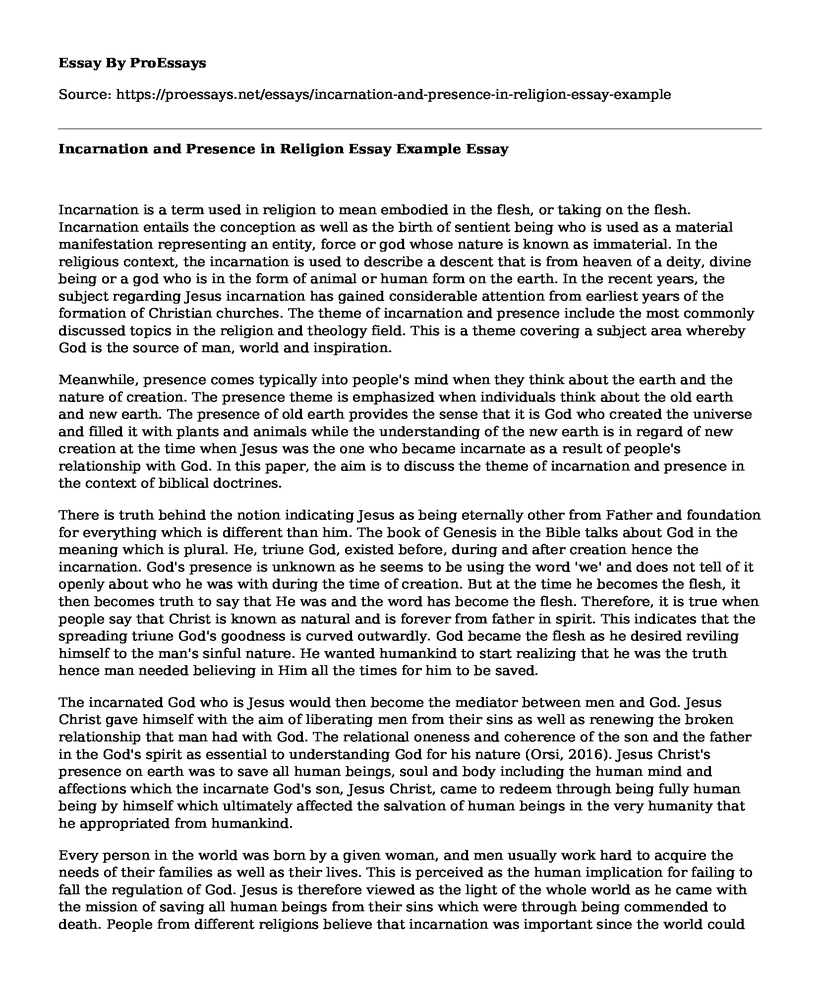Incarnation is a term used in religion to mean embodied in the flesh, or taking on the flesh. Incarnation entails the conception as well as the birth of sentient being who is used as a material manifestation representing an entity, force or god whose nature is known as immaterial. In the religious context, the incarnation is used to describe a descent that is from heaven of a deity, divine being or a god who is in the form of animal or human form on the earth. In the recent years, the subject regarding Jesus incarnation has gained considerable attention from earliest years of the formation of Christian churches. The theme of incarnation and presence include the most commonly discussed topics in the religion and theology field. This is a theme covering a subject area whereby God is the source of man, world and inspiration.
Meanwhile, presence comes typically into people's mind when they think about the earth and the nature of creation. The presence theme is emphasized when individuals think about the old earth and new earth. The presence of old earth provides the sense that it is God who created the universe and filled it with plants and animals while the understanding of the new earth is in regard of new creation at the time when Jesus was the one who became incarnate as a result of people's relationship with God. In this paper, the aim is to discuss the theme of incarnation and presence in the context of biblical doctrines.
There is truth behind the notion indicating Jesus as being eternally other from Father and foundation for everything which is different than him. The book of Genesis in the Bible talks about God in the meaning which is plural. He, triune God, existed before, during and after creation hence the incarnation. God's presence is unknown as he seems to be using the word 'we' and does not tell of it openly about who he was with during the time of creation. But at the time he becomes the flesh, it then becomes truth to say that He was and the word has become the flesh. Therefore, it is true when people say that Christ is known as natural and is forever from father in spirit. This indicates that the spreading triune God's goodness is curved outwardly. God became the flesh as he desired reviling himself to the man's sinful nature. He wanted humankind to start realizing that he was the truth hence man needed believing in Him all the times for him to be saved.
The incarnated God who is Jesus would then become the mediator between men and God. Jesus Christ gave himself with the aim of liberating men from their sins as well as renewing the broken relationship that man had with God. The relational oneness and coherence of the son and the father in the God's spirit as essential to understanding God for his nature (Orsi, 2016). Jesus Christ's presence on earth was to save all human beings, soul and body including the human mind and affections which the incarnate God's son, Jesus Christ, came to redeem through being fully human being by himself which ultimately affected the salvation of human beings in the very humanity that he appropriated from humankind.
Every person in the world was born by a given woman, and men usually work hard to acquire the needs of their families as well as their lives. This is perceived as the human implication for failing to fall the regulation of God. Jesus is therefore viewed as the light of the whole world as he came with the mission of saving all human beings from their sins which were through being commended to death. People from different religions believe that incarnation was important since the world could have been different if it did not happen.
The Trinity is usually made of God the Son, God the Father, and the Holy Spirit. The concept of the Trinity is generally what most Catholics believe in although there are other worldwide religions which believe in different beliefs. From the three Divine Persons, Jesus Christ is regarded as the one who is most qualified for bringing the renewal of the creation since it was via him that creation was accomplished (Deferrari, 2007). Jesus came into earth to show human beings his dignity as well as saving a human from sins.
Conclusion
In conclusion, the theme of incarnation and presence comes in place on multiple occasions. Incarnation is seen during the new time of new creation whereby God is the one who becomes incarnate. The word becomes the flesh thus it creates a new beginning for the walk of life. Additionally, God comes in the flesh with the aim of dying for the sins of human beings across the world which makes way for the spread of presence of God. Therefore, incarnation opens all doors to new creation which is critical in promoting the presence of God's kingdom.
References
Deferrari, R. J. (2007). Hugh of Saint Victor on the Sacraments of the Christian Faith :(De Sacramentis). Wipf and Stock Publishers.
Orsi, R. A. (2016). History and Presence. Harvard University Press.
Cite this page
Incarnation and Presence in Religion Essay Example. (2022, Aug 23). Retrieved from https://proessays.net/essays/incarnation-and-presence-in-religion-essay-example
If you are the original author of this essay and no longer wish to have it published on the ProEssays website, please click below to request its removal:
- Essay on Art Politics and Religion
- The Idea of God in Christianity Orthodox in the USA - Paper Example
- Essay Sample on Hebrews With the Issue of Marriage
- The Pagan Influence on Christianity Essay Example
- Essay Example on Religious Texts: Uniting Societies Through Character & Spirituality
- Moral Beliefs and Arguments for the Existence of God - Essay Sample
- Christianity View of Suicide - Essay Sample







